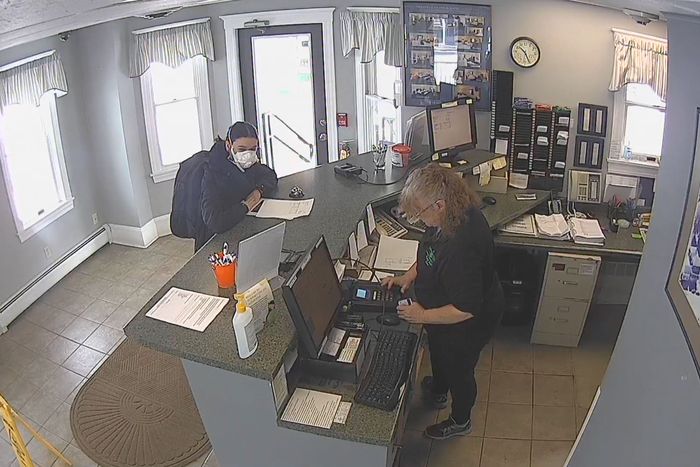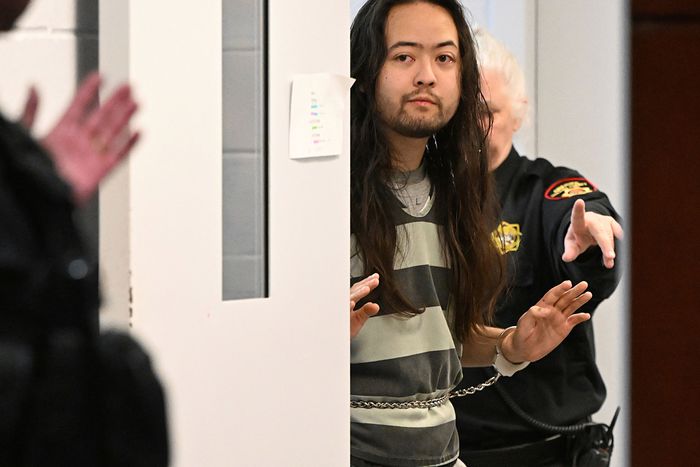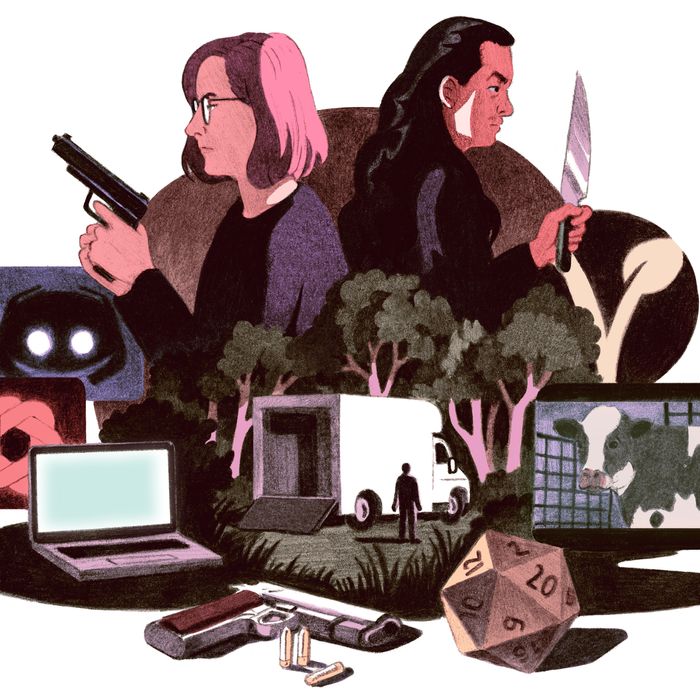
This article was featured in One Great Story, New York’s reading recommendation newsletter. Sign up here to get it nightly.
Milo Youngblut was homeschooled until the sixth grade. Their parents were devout Christians who said grace before every meal and were careful to balance algebra lessons with creationism when giving lessons in the kitchen of their Seattle home. The Lakeside School seemed an ideal place to mainstream an intelligent but sheltered child. Small and selective, it’s the kind of place where a double-digit percentage of seniors attend MIT some years. (Bill Gates sent his kids to Lakeside, so did Jeff Bezos.) Youngblut fit in straightaway. They joined choir, the coding club, the quiz-bowl team; they slipped in easily with a group of like-minded math nerds. By the ninth grade, they began to shed their childhood religious beliefs and came out as nonbinary, announcing a new name drawn from their favorite book, The Phantom Tollbooth. Suddenly, Youngblut was an upbeat, pink-haired teenager with a full social life. “Let’s go swing dancing and then watch MCU,” they wrote in their best friend’s yearbook.
Most kids were friendly with one another at Lakeside; the school has fewer than 1,000 students. Still, Youngblut didn’t know much about Maximilian Snyder, an intense, quiet boy two grades above them. They nicknamed him “suitcase kid” for the way he strode purposefully around campus, roller-suitcase in hand. Snyder lived with his mother and stepfather in Kirkland, an upscale Seattle suburb. His father, a gifted coder, was an early employee at Microsoft who committed suicide when Snyder was 16. Classmates seemed to find him aloof, argumentative. “He often wore his intelligence poorly,” a classmate told me, “with more arrogance and condescension than was warranted … In many ways, he reminded me of a little boy.” He didn’t have many friends, seeming to prefer fantasy worlds. He wrote a vocal piece for the Lakeside choir based on The Kingkiller Chronicle, a fantasy series, and published chapters of a short novel about a young wizard. “There was once a boy who wanted to know,” it began. “Everything, maybe. Anything.”
None of their classmates would have predicted that only five years after Snyder’s graduation, he and Youngblut would be engaged. Even less that they’d be on opposite sides of the country, working two sides of a mission that would send them both to jail. In late January, in a run-down neighborhood in Vallejo, California, Snyder, wearing a beanie and a mask, allegedly walked up to an 82-year-old trailer-park owner named Curtis Lind, put his arm around his shoulder, and stabbed him in the chest with a knife. Then, according to prosecutors, he slashed his throat. A few days later, Youngblut, clad in body armor with a gun holstered to their side, was pulled over in Vermont by Border Patrol agents. According to prosecutors, they stepped out, raised a gun, and opened fire, killing a young agent named David Maland.
It took the authorities time to realize that Snyder and Youngblut were acting under the influence of one group. The Zizians, a Bay Area-based “cult,” had a very specific vision for the future. They were convinced that some day soon, AI would surpass human intelligence and take over the world. And they believed that if those who worked on AI were meat-eaters, that super-intelligent AI would use the meat industry as a blueprint for how society worked: enslaving and torturing humanity for all eternity in factory farms spread across the galaxy. To prevent this, they would have to work to turn everyone, and especially those who worked on AI, vegan. Snyder and Youngblut were relatively new converts to the cause. They had spent the past few years becoming indoctrinated without ever having met one of the group’s members in person, absorbing their message entirely through niche blog posts and chat rooms. Slowly but surely, they had cut off contact with all of their family and friends. Except to ask one question: “Hey, are you vegan yet?”
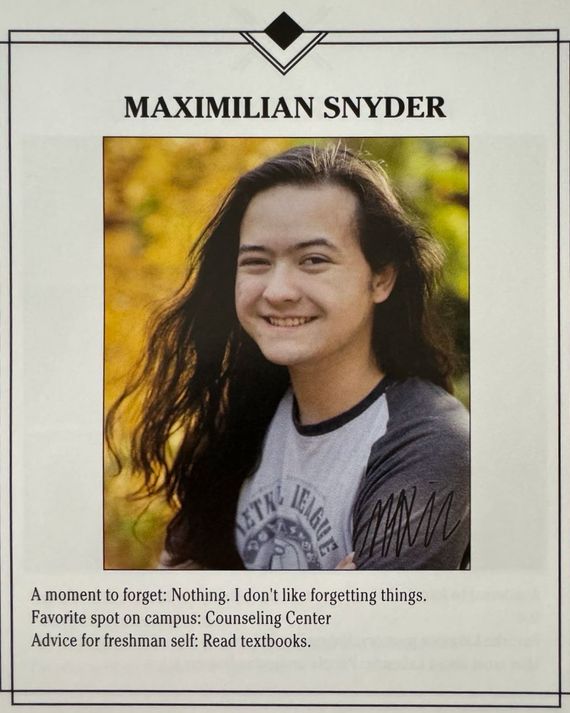
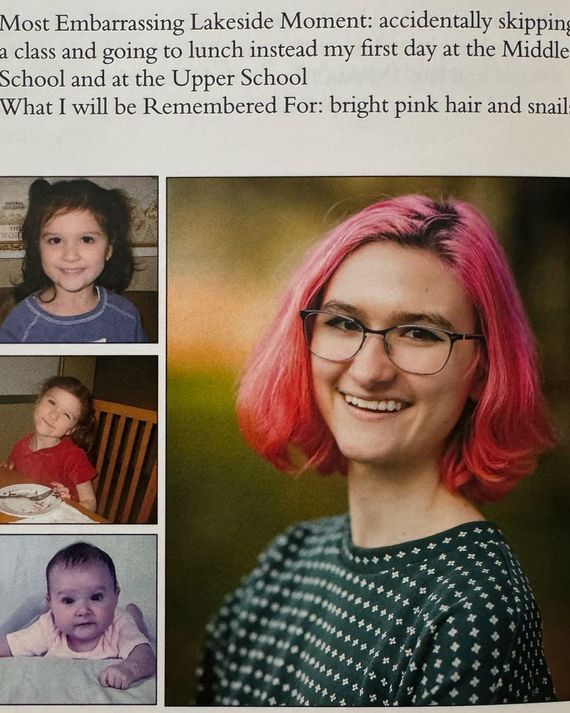
Toward the end of their senior year, Youngblut received an Instagram message from Snyder, who was at Oxford, studying philosophy and computer science. He told them that a few years before, in a choir class, he had overheard Youngblut talking with their friend about a sprawling fan-fiction epic called Harry Potter and the Methods of Rationality. Years earlier, the book had sparked an intellectual journey for him, he said, and had led him to the wider rationalist community, a burgeoning scene of nerdy, tech-adjacent young people obsessed with achieving self-improvement through clearer thinking. Snyder and Youngblut started talking regularly on Discord, sending hundreds of messages back and forth daily, about philosophy and AI risk and sexual fantasies, along with mundane updates on meals and homework. Later, Youngblut messaged their best friend, Ash, to gush about Snyder. “So basically,” they wrote, “I have a friend with benefits now. But it’s more complicated.” (Ash, who also uses nonbinary pronouns, shared with me thousands of messages between them and the couple dating back five years.)
Youngblut seemed both excited and nervous. Though the two hadn’t met in person yet, they had a deep connection with Snyder, and the relationship had quickly taken on — as they wrote — “power dynamic-y” overtones. “We talk about them reshaping my brain,” they wrote Ash in August 2022. There was a BDSM element, Youngblut said, both physically and mentally. Snyder told Youngblut to refer to him as their “master” and “owner,” and to address him as “sir” in conversation. “My master is like fucked up, not mentally ill,” they wrote. Snyder was visiting Seattle on summer break. “Very, very sane, but also probably a little bit psychopathic,” they wrote to Ash. “Definitely sadistic, at least a little which is okay, because apparently I’m a masochist, and I had no clue. Like, he full on slapped me multiple times yesterday, and I was like, ouch. I’m scared of you right now. But also it was really nice. Don’t worry, we had discussed it.”
He was brilliant, they gushed, intimidatingly so, to the extent that Youngblut felt starstruck by his intelligence. They particularly liked learning about rationalism, which “successfully deconverted me from Christianity almost the entire way,” they told Ash. Ash noticed their friend changing. “I very much hear the influence of rationalist-esqueness in your speech,” they wrote to her. “Yeah I picked some things up,” Youngblut said. They had a running joke with Snyder “that I should never say that I won’t do something for them, because so far, I have ended up doing it and being completely fine with it later.”
Ash told Youngblut it sounded a bit like Snyder was more therapist than boyfriend. Youngblut responded that Snyder was “literally a genius, intelligence gap lol. Just the fact that he can outsmart me, and that I’m much more easily manipulated.” They felt so in his thrall that: “I was half-seriously considering writing an anti brainwashing thing for myself, lmao. Just a Google Doc with my values and important things to me and stuff.”
By the time Snyder first messaged Youngblut, he had been deep into rationalism for years. Which mostly entailed reading a lot of books, blogs, and Discord posts by a man named Eliezer Yudkowsky. An autodidact who grew up obsessed with science fiction, Yudkowsky founded a nonprofit that came to be known as the Machine Intelligence Research Institute in 2000, meant to solve what he described as the “alignment problem”: How could we align the interests of a future artificial superintelligence with those of humanity so it wouldn’t decide to kill us all? Peter Thiel was an early donor.
Yudkowsky wasn’t just interested in building safer robot minds; he wanted humans to improve their own too. In 2009, from his home in Berkeley, he launched LessWrong, a blog he described as being “devoted to refining the art of human rationality and creating rationalist communities.” In a series of blog posts, he laid out methods for improving thinking by eliminating cognitive biases and applying Bayesian probability to decision-making. Yudkowsky had a gift for making hyperniche concepts accessible. This was someone for socially awkward rationalists to look up to: a swaggering, fedora-clad ultrageek whose intimidating intellect was matched only by his self-regard. “I have been seriously and not in a joking way accused of trying to take over the world,” he wrote in his OkCupid profile.
The community that formed around Yudkowsky — a mix of Silicon Valley elites with Stanford and Google on their résumés and young STEM types — saw their minds as similar to computers, capable of system upgrades via new modes of thinking. They were nerds who shared his intelligence fetish and outsider identity, along with his interest in sci-fi, fantasy, anime, fan-fiction, video games, and tabletop RPGs. “We tend to attract people who are unwelcome in other parts of the world,” a rationalist wrote in a blog post. “This includes a lot of autistic people, trans people, atheists from religious communities, etc.” Another rationalist described the community to me as a “mental-health support group” for autists and those with ADHD. Snyder — who first posted on LessWrong when he was 15 — treated Yudkowsky as one might an especially cool professor. He adopted the older theorist’s convictions about AI risk, his posture of intellectual superiority, even his interest in BDSM. He seemed especially compelled by Yudkowsky’s stance on mortality. “Death is a great evil, and I will oppose it whenever I can,” Yudkowsky wrote, following the tragic death of his younger brother in 2004. He urged his followers to try to bring about a future where the singularity — the moment when an artificial intelligence gains the ability to rapidly enhance its own programming, reaching levels of power beyond imagination — could end death for everyone. Snyder, who’d only recently lost his father, shared this hope. He referred to people who accepted the inevitability of death as “deathists.”
In 2010, Yudkowsky began publishing chapters of Harry Potter and the Methods of Rationality, the book Snyder noticed Youngblut reading at Lakeside. HPMOR, as it became known, reimagined Harry as a rationalist who joins Ravenclaw instead of Gryffindor. Over the course of thousands of pages, rationalist Harry uses logic and decision theory to save the world and defeat Voldemort. Snyder, and other young readers like him, experienced the book as a real-life Hogwarts letter, an invitation to join a community of intellectuals trying to save the world. Many flocked to the Bay Area to join the rationalist scene and work at Yudkowsky’s MIRI or its then-sister organization, the Center for Applied Rationality, which opened in 2012. Where MIRI focused on technical AI safety research, CFAR was meant to home in on strategies to help rationalists improve their cognition. All of this could trigger intense emotions. In a blog post, a rationalist and CFAR co-founder named Michael Valentine Smith described his time in the movement: “When I was in the thick of this AI apocalypse story, everything felt so … epic. Even questions of how CFAR dealt with garbage at its workshops seemed directly related to whether humanity would survive the coming decades.” In hindsight, CFAR co-founder Anna Salamon told NBC, “we were creating conditions for a cult.”
Ironically, considering their emphasis on atheism and systematic reasoning, a number of rationalists ended up believing in something like magical thinking. Many became convinced that thought experiments — like Roko’s Basilisk, a hypothetical future AI that punished anyone who hadn’t helped bring it into existence — could be “infohazards,” a term used for ideas so scary and powerful they were capable of causing real-life derangement. (In a blog post titled “Occupational Infohazards,” one rationalist described being driven to psychosis by scenarios of evil AIs torturing humanity.) Some rationalists fell into occult practices like tulpamancy, a practice ostensibly derived from Buddhism and popularized by My Little Pony fans on 4chan, which involved using meditation exercises to apparently create independent sentient entities that live in one’s brain. A community of people who first bonded over Harry Potter may have been more likely to treat ideas like spells; either way, it’s difficult to separate the moment from the heady fumes of potential that gripped the Bay Area in the 2010s. Unreal things seemed possible. Money flooded into AI research labs. Companies like OpenAI made astonishing technological progress. Silicon Valley elites backed rationalist ideas financially and culturally (Elon Musk and Grimes bonded over Roko’s Basilisk; disgraced Alameda Research honcho Caroline Ellison named her Tumblr after a line from HPMOR). Amid the fervor, some of the sharpest and most impressionable minds in the country ended up lost in thickets of acute irrationality.
In 2023, Snyder took a leave of absence from Oxford and moved into a small apartment his family rented in Kirkland, a leafy upper-middle-class suburb outside Seattle. Youngblut was nearby, studying computer science at the University of Washington. The two grew closer, spending nights watching anime and eating vegan food. “MOLLY MOONS HAS A VEGAN BROWNIE BATTER ICE CREAM FLAVOR,” they wrote him in July 2023. “OMG AAA,” he responded. The two saw Ash often, too — they were taking a gap year before college and living in the area. Soon, the three began sleeping together.
Other than spending time with Youngblut and Ash, Snyder didn’t have much of a social life. “I’ve demonstrably chosen to have 0 friends for much of my life rather than have friends who I can tell won’t be on the same page as me,” he wrote on X. He got upset when the two weren’t available to hang out. “What is with u guys and not being sure of plans all the time, is this some kind of living with parents thing im too free to understand,” he wrote them. “Max u have two people that u wanna see,” responded Youngblut. They had other commitments: their parents, their close-knit group of high-school friends. “Family smh,” Max responded. “Most people are extremely resistant to the idea that most people might be fundamentally acting in bad faith,” he wrote, “including their friends and family.”
For Snyder, companionship was downstream from the rigid moral principles that governed his life. Even among Discord rationalists, no slouches on the intellectual superiority front, his attitude rubbed many the wrong way. He often DM-ed acquaintances out of the blue to ask if they were vegan. If they said “no,” he’d argue with them about why they ought to be. At one point, an acquaintance he was interrogating asked if he really only stayed friends with people who shared his diet. “Mm the ones that aren’t at least going to become vegan are fake friends,” he wrote back. “My best friend is vegan and is the main person I really think of as a friend.” He continued: “i don’t like maintain a bunch of fake friends or anything tho i just know some people and have patience for them approximately in proportion to how likely they are to become vegan.” Nine months later, Snyder wrote to her again: “Hey are u vegan yet?”
He spent hours a day on Discord chats and forums where rationalist discourse flowed, sifting for nuggets of theoretic grist to chew over. (Snyder to Ash: “Do you know the concept of reinforcement layers versus expected utility maximizers? I imagine not.”) Jargon aside, most of his ideas seemed to boil down to something fairly straightforward: that the world is divided into good and evil people, mostly evil. The latter were driven only by hedonistic self-interest; good people, meanwhile, were willing to sacrifice everything for the sake of humanity. Goodness was a kind of unchangeable neurodivergence, he liked to say. Yudkowsky’s version of Harry Potter “wouldn’t become evil even if he pretended to be voldemort for a thousand years.” Evil people, meanwhile, often pretended to be good for social advantage. It was critical to identify the real good people among the fakers, because they were the only ones capable of truly saving the world from evil AI.
Some of this philosophy stemmed from mainstream rationalists like Yudkowsky, but increasingly, much of it didn’t. In June 2023, Youngblut confessed to Ash that Snyder was taking in information from a forbidden source of knowledge. They were circumspect about who it was. “Max has been reading a lot of infohazard stuff by this one person,” they told Ash, “and he’s been incorporating some, not all, of it into his belief system, and he’s been telling me about some of it … A lot of it requires more decision theory knowledge for me to really understand.” They did seem to understand, though, where they fell on Snyder’s increasingly rigid spectrum of good versus evil. “I genuinely might be evil,” they told Ash. “I don’t really understand it yet,” they wrote, “but I’m learning.”
Ash felt a stab of unsettled curiosity. Did their friends and lovers think they were evil? They asked Snyder to explain what exactly he meant by good and evil. He offered a typically convoluted response: These concepts were extremely deep-rooted in the mind, he said. “Evilness is like if you trace back the reason they decided X, and also the reason for that reason, and the reason for that reason, and so on, until there’s nothing deeper, is the deepest reason, something which is fundamentally selfish or slash in bad faith,” he wrote. And furthermore: “The reality that so many people are in bad faith on such a fundamental level is scary.” Any attempt to undermine this extreme moral binary ought to be treated with suspicion: “Bad people THRIVE on ambiguity, greyness, DARVOing, muddying the waters, and ‘second chances.’” The world, he argued, was “more black and white than most people think.”
Youngblut chimed in: “Max is ***pilling everyone he comes into contact with.” At the time, Ash was unsure what the asterisks meant. Looking back, they say: “That was Ziz for sure.”
Ziz LaSota came from Alaska to the Bay Area in 2016. The 25-year-old transwoman quickly became a curiosity in the rationalist scene — she wore black robes and published long blog posts about a theory she had helped develop about the hemispheres of the brain, which she believed were distinct entities that had the capacity to be good or evil. Ziz felt it was important that only people with two good hemispheres — “double goods,” as opposed to “single goods” with one evil hemisphere, or, God forbid, “nongoods” with twin evil hemispheres — be allowed to work on critical AI risk research. She asked Salamon, the CFAR founder, to help her get a position at Yudkowsky’s MIRI, where she hoped to assess the hemispherical goodness of job applicants. She stressed that this plan was of extreme importance. “I did not think that was a thing I wanted to assist with,” Salamon told me. Ziz freaked her out on a gut level. She felt “scared,” she said. “I can’t recall having a feeling like that at other points in my life, ever.”
Hemisphere theory wasn’t the only thing Ziz wrote about on her blog over the course of the 2010s. She also preached militant veganism, believing that meat-eaters — or “carnists” — were “flesh-eating monsters.” She believed that people (or, at least, their hemispheres) were inherently good or evil at a level below active consciousness. And most of all, she believed that vegans should be put in charge of AI development. Specifically, she believed she should be put in charge. If she did ever find herself in that position, she wrote on her blog, punishment would swiftly come down on non-vegans and carnivorous animals, whom she considered just as guilty of murderous carnism as Guy Fieri.
Her writing — which often drew from nerdy staples like Star Wars and Harry Potter — could be violent, a delirious blend of youthful fantasy imbued with a very adult thirst for bloody vengeance. She quoted a line from Yudkowsky’s fan-fiction, when the evil Professor Quirrell encourages Harry Potter to “think purely of killing. Grasp at any means to do so.” This inspired a violent image of killing Anna Salamon, who she felt had rejected her. “I would try to crush or tear their windpipe if it didn’t jeopardize my grip,” she wrote, referring to Salamon. “With my right hand, I would stab their eyes with outstretched fingers. I didn’t know how much access there was to the brain through the eyesockets, but try to destroy their prefrontal lobes as fast as possible.” While many people were disturbed by these posts, others were drawn in by their baroque malevolence and the grand scale of Ziz’s vision. On Discord, Ziz and her followers would share bloody fantasies of revenge against what they called Vampireland, their name for the regime of meat-eaters they believed was damning humanity to AI hell.
In 2019, she and three friends — Gwen Danielson, Alexander “Somni” Leatham, and Emma Borhanian — staged a protest at a CFAR event held at a campground in a forest. Wearing black robes and Guy Fawkes masks, they blocked the road with their box trucks, inadvertently trapping an unrelated group of children inside the camping area, and tried to deliver a speech accusing the organization of corruption. They didn’t make it very far before police, concerned by the presence of children and false reports the protesters had a gun, swooped in. All four were arrested and charged with felony conspiracy to commit a crime and misdemeanors like obstruction of justice. Afterward, Ziz and her group became insular. The Zizians were banned from CFAR workshops and rarely appeared at rationalist social events. Ziz and several disciples — Leatham, Borhanian, and another young person who went by Suri Dao — moved into box trucks, parked on a lot in a run-down neighborhood on the West Side of Vallejo. Others orbited them, including Jamie Zajko, a 29-year-old with a bioinformatics master’s degree from Temple University, and Daniel Blank, an autistic 23-year-old with a degree from UC Berkeley in bioengineering and computer science.
Though they had retreated from the community, the Zizians — as others began calling them — kept posting, showing up in rationalist Discords to argue about veganism and AI risk even as they were charged with felony trespassing and obstruction of justice from the campground incident. But then, in November 2022, their landlord, a kindly 80-year-old named Curtis Lind, tried to evict them from the plot of land where they parked their trucks; the group hadn’t paid rent for over two years. He was fearful of his tenants, who had grown increasingly violent when he asked them for rent, threatening him and throwing rocks at him. Lind had started carrying a handgun on the property. The eviction conversation didn’t go over well. Days later, Leatham lured him over to a box truck, where the group attacked him, shattering his skull and stabbing him through the upper torso with a samurai sword, according to Solano County prosecutors. Lind grabbed his gun and opened fire, killing Borhanian and injuring Leatham. Later, Lind’s friends found bottles of lye among the Zizian’s possessions; they suspected the group had planned to chop up and dissolve their landlord’s body. Leatham and Dao were arrested at the scene and later charged with murder, but Ziz was let go.
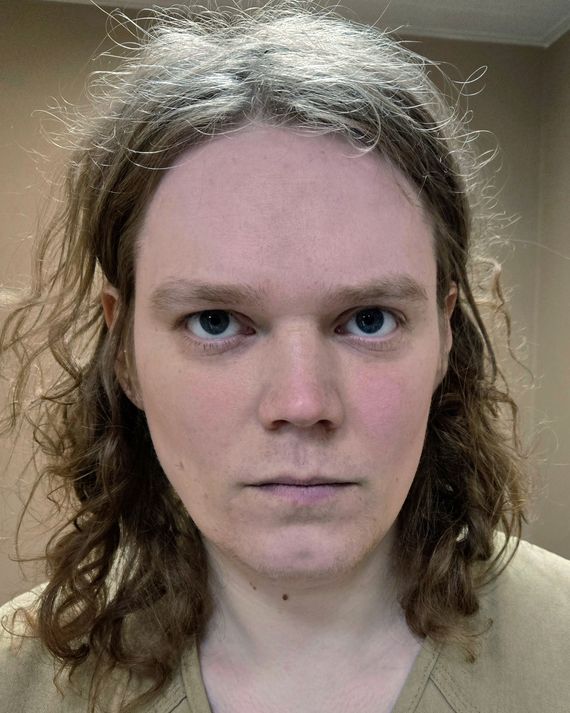


In July 2023, Youngblut had a big update for Ash. After months of pressure from Snyder, they were becoming vegan. “U should join me!!!! factory farming is HORRIFIC,” Youngblut wrote to their friend. “it’s so evil.” Then they sent a link to Dominion, an Australian documentary narrated by Joaquin Phoenix, Rooney Mara, Sia, and Kat Von D that used drones and hidden cameras to investigate the meat industry.
Being vegan was only the start. “I am still working on getting a lot stronger and learning a lot more. It is very important,” they told Ash. “I want to talk to you about important things … Veganism and my life goals and stuff.” They started describing their own mind in strange new ways: “A lot of my executive dysfunction, at least, stems from sub agents having contradicting wants,” they wrote. “And it’s not always a good idea to force things that promote internal violence.” Youngblut was still going to class at the University of Washington, but this new way of thinking made them newly skeptical of anything that conflicted with the higher purpose: parents, school, and friends, and especially those who weren’t vegan. In bits and pieces, Youngblut let slip to Ash that there was a larger point to all this self-improvement. They were planning something with Snyder. The plan had to stay a secret, at least from Ash, because they were still assessing whether Ash was really good. And only if Ash proved themself to be truly good would they be shown the specifics of the mission. “We’re still not quite sure about you, and what your alignment is,” Youngblut said one day that summer. “There’s just some things that we’re not gonna tell you, for OpSec reasons.”
Over the course of that summer, Ash occasionally went to Snyder’s condo for dinner, often followed by sex with the couple. The apartment felt claustrophobic, littered with moving boxes, even though Snyder had been living there for months. One night in July, Snyder and Youngblut hunched over the stove preparing vegan fish fingers and fries. Watching from the couch, Ash was struck by how close they had become. The couple seemed to speak their own dialect, a mélange of rationalist jargon with twee internet speak: “eepy” in place of sleepy; references to vegan “mac n’ cheems” and “Dino chicken nuggies.” As they cooked, Snyder talked about morality and coercion. Good people had to be un-coercible, he said, even in the face of violence. In fact, he and Youngblut once mentioned plans to waterboard each other to raise their pain tolerance. (This came from Yudkowsky, who argued for building up one’s resilience in the face of threats like blackmail and torture.) Being good wasn’t just an abstraction, he continued. Like Ziz, Snyder wanted to identify and work with other good people to build a morally aligned vegan AI superintelligence.
Ash tried to keep up as Snyder explained how the good people — a category that included all noncarnivorous animals — would eventually be uploaded to “the simulation.” As they ate, he described a sort of digital Noah’s ark where animals and good humans could frolic together in eternal bliss. There, “I would be friends with lots of good people,” he said, like cows, “who are really sweet.” They would all “be friends and have a good life and live forever because death is evil, and do interesting things.” Youngblut seemed to have fully bought into this vision. When Ash asked Youngblut about their hopes for the future, they responded: “Might be nice to have some kids with Max.” Not in the real world, though: Youngblut hoped to raise children in the simulation.
After the attack on Lind, the Zizians who’d stayed out of jail didn’t retreat. On January 2, 2023, the parents of Jamie Zajko were found shot to death in their suburban Pennsylvania home. Two weeks later, Ziz, Zajko, and Blank were arrested in a Pennsylvania hotel in connection with the killings. But none was charged for the murders. Blank and Zajko were released, while Ziz remained in jail on charges of obstructing justice relating to her arrest. The group disappeared even from Discord. Some members went to a remote house in Coventry, Vermont, while others lived in a rented house in the woods in Chapel Hill, North Carolina. Even then, new members were joining; Ophelia Bauckholt, a 26-year-old German working at a New York quantitative trading company, cut off her friends and moved to the house in Chapel Hill that November.
Only members of the rationalist community seemed to realize the Lind assault and the Zajko murders were related, and they were extremely nervous. An anonymous blog post warning about “risks of physical violence from Ziz” made the rounds among the rationalists; and in rationalist fashion, they debated in the comments section about which decision-theory strategy seemed to be guiding Ziz’s choice of targets. Anonymous rationalists hired a PI to sit in on Ziz’s ongoing court appearances. On Discord and in person, rationalists whispered about the supposed danger of reading Ziz’s writings — words so potentially radicalizing and dangerous they constituted a severe infohazard. Snyder was not deterred. If anything, the violence seemed to bring him closer to the cause. After all, he wrote to Youngblut and Ash, “[m]ost things aren’t immoral if done to bad people.”
In late June 2023, he posted in a group chat called the Ziz Circle on an encrypted messaging platform. Snyder had been trying to recruit online acquaintances to help the Zizians, and a handful wanted to hear him out. “I wanna get ziz out of prison,” Snyder wrote. “Her friends can pay bail but she needs an address + proof that she can stay at said address.” He regretted that he “did not know them before they were in jail,” since they were the “correct level of ambitious,” aligned with his own world-saving mission. Someone asked if it were true that the Zizians had attacked someone with a sword. “I dunno if zizians have murdered someone with a katana,” Snyder responded, “and very possibly wouldn’t tell you if they did. I think murdering people with katanas is in many cases correct or if incorrect only incorrect strategically.”
Youngblut seemed to think so too. By that fall, the dynamics of the trio had shifted. As Youngblut fell deeper into Snyder’s world, Ash was speaking to them less and less. The group sex was no longer. Youngblut was mostly living with Snyder at his condo, barely going to class, and growing increasingly moralistic. When they found out Ash had taken a break from veganism, they grew angry and insisted they meet up to watch Dominion. Ash relented, watched the film, and recommitted to veganism. Soon after, they went out for dinner with Ash to a vegetarian restaurant. They talked, as usual, about good and evil. Youngblut told Ash that if they could press a button that would kill all evil people, they would press it. Shocked, Ash asked if Youngblut thought they were evil. “On balance of probability, you are,” Youngblut answered. “It would be better if you killed yourself.”
That spring, Youngblut secretly moved their things out of their parents’ house. Their parents panicked and began frantically contacting Youngblut’s friends and their parents, looking for information on their missing child, who they feared had joined a vegan cult. Learning that Youngblut had cut off old friends, they filed a missing person report and reached out to the counseling center at the University of Washington. In emails, they said the counseling center had informed them Youngblut was likely “part of a cult, or a dominant, abusive relationship.”
Youngblut joked with Ash on Discord about their parents’ concerns. “Time to do vegan cult activities like putting away the leftovers lol,” they wrote. “The VEGAN leftovers.” They were excited, undeterred: They were going to buy a box truck with Snyder, they told Ash, convert it to be livable, and then drive around the country. “Boxy trucky stuff is coming along,” they wrote in June. “We have until the end of the month to move out.” In the meantime, they kept checking in on Ash’s veganism. “Is ur partner vegan? i know you’ve been talking to ur friends about being vegan,” they wrote. “We’re happy that you have a vegan partner. That is very awesome.” They asked Ash if they would like to come over for vegan food.
Ash said they were unsure, given how disappointed in them Youngblut had seemed the last time they hung out. “You’ve been vegan since december!” Youngblut wrote back. “i was pretty upset in december, my trust for u went way down. it is back up more now that u have been vegan for a while and talked to ur friends about being vegan and whatnot.” Ash said they still weren’t sure; they confessed to feeling uneasy around the couple. “Do u feel more unsafe around me than max?” Youngblut asked. They continued: “I felt pretty unsure and a little unsafe around max for a while as i was learning about what he believed and seeing whether i believed it too and was looking at the world and finding out that it looked much different from how i thought it did.” They added: “since i keep reaching out to you and wanting to talk to you, you can infer that i think there’s a decent chance that ur good and if i stop reaching out to you, then ive decided otherwise.”
Youngblut tried to see Ash once more a few months later, but Ash demurred. “Just let me know,” Youngblut responded. Four hours later:
“Are you still vegan?”
“Yep,” Ash wrote. Youngblut: “Yay”
It was the last time Ash spoke with them.
In November, Youngblut left Snyder and drove the box truck they’d fixed up to Chapel Hill to live with Ziz, Zajko, Blank, and Bauckholt. That month, they applied for a marriage license with Snyder in Washington State. It’s not clear how the newly expanded group of Zizians spent their days. Their landlord would later tell reporters he found a medical stretcher inside the house. A Google Map photo shows a box truck parked outside, a satellite receiver perched on the hood. Candice Welch, a neighbor, described seeing these “very weird looking people wearing black all the time,” walking out of the woods together at odd hours. Ziz carried a rifle in her black robes. “On weekends, you would always hear shooting, like somebody was using something as a range,” said Welch. Photos, taken later, show empty boxes of ammunition and containers of Soylent and supplements, a book about the Scandinavian resistance movements during WWII, with detailed descriptions of how they poisoned their occupiers’ water supply, large tanks of argon gas, and a cutting device. There were boxes of surgical masks, a black metal face mask, receipts from chemical-supply companies, and a respirator, along with an order slip for a surgical device called a rongeur, used for cutting small bits of bone.
In January, the group decided to leave the house in North Carolina. Youngblut was tasked with calling a Realtor in rural Vermont about renting an 11-acre property off the grid; they introduced themselves as Connie and said they would be coming with a friend, Sam. The Realtor suggested visiting the property — a fixer-upper listed for nearly $200,000 — in the spring when the roads were more passable. “We don’t want to wait till spring,” Youngblut said. The Realtor agreed to meet them the next morning but canceled when she learned the road wasn’t plowed. Youngblut went anyway with Bauckholt, the runaway quant. They stayed in Vermont over the next week, checking in and out of hotels, wearing masks, body armor, and holstered handguns. Their outfits alarmed one front-desk employee so much that she called the police. Later that day, investigators from the Vermont State Police and Homeland Security Investigations tried to interview Youngblut and Bauckholt; they checked out of the hotel and into another one in the area. They seemed paranoid, anxious — security footage from January 15 shows Bauckholt pacing nervously in a snowy parking lot while Youngblut checks in, dressed in black with a mask pulled tightly over their face. When a car pulls into the lot, Bauckholt ducks into the shadows.
Three thousand miles away, in Vallejo, Snyder was acting erratically, too; people who saw him perched on roadside bollards thought he might be homeless. At one point, a drone flew overhead and he ran up to a worker at an auto-body shop to ask if he was controlling it with his phone. On January 17, he allegedly killed Lind, then took off, driving north. Afterward, an acquaintance from Discord DM-ed Snyder to ask if he had ever heard of the Zizians. “What about ’em,” he responded. He was arrested that evening. Three days later, Bauckholt and Youngblut got in their car and set off southbound on I-91 near Coventry, Vermont, only 20 miles from Canada. Both of their cell phones were wrapped in tinfoil; they wore guns on their hips. According to law-enforcement records, when Border Patrol agents pulled them over, Youngblut stepped wordlessly out of the driver’s seat, raised a Glock, and started firing. When Bauckholt tried to draw her weapon too, agents unleashed a wave of bullets. One of the agents, David Maland, died on the side of the road. So did Bauckholt. Youngblut was taken to a hospital nearby, then to a local station. Later, they were charged with two federal firearms charges and pleaded not guilty.
In the aftermath of the killings, agents fanned out across the country, raiding the North Carolina property and searching for the remaining Zizians on the loose. On February 16, almost four weeks after the Vermont shootout, Ziz, Zajko, and Blank were arrested in Frostburg, Maryland. They had parked two box trucks on a rural piece of land, asking the landowner if they could camp there for a month. Suspicious of their demeanor, he had called the police. Their charges were minor: trespassing on private property and obstruction. Zajko and Ziz also faced obstruction and gun charges. Later, authorities added a federal gun charge for Zajko, claiming she lied about her address when purchasing the gun that Youngblut would use to shoot Maland. Prosecutors are likely working on more charges: I obtained the sealed warrant used to search the North Carolina property, which revealed that agents were investigating Zajko, Youngblut, and Bauckholt’s links to a homicide and their “affiliation with a group known as the ‘Zizian’s.’”
To Ash, this outcome was as mystifying as it was tragic — could it really have been part of the master plan their friends had spent years devising? Snyder sitting on the side of a dusty road, stalking and killing an old man? Youngblut shooting a random cop on a rural highway? Ziz back in jail? Ash wondered what would have happened if they never shared Harry Potter and the Methods of Rationality with their friend — the book that prompted Snyder to reach out in the first place. “Milo was only into HPMOR because I was into HPMOR,” they wrote later in a Medium post. “Could we have caught it then?” But who would have thought to fear it? Harry Potter fan-fiction, Dungeons & Dragons, sci-fi, anime, a love of math and logic; these totems of nerd culture are typically seen as harmless pastimes for intelligent, sensitive children. They represent the cultural inverse of so many parents’ worst nightmare: Andrew Tate and the specter of violent incel-dom. But in this case, the outcome wasn’t so different. A set of lonely, stunted youth, who saw themselves as purehearted vegan crusaders for goodness, roamed the country in box trucks, fighting evil meat-eating vampires with rifles and swords. Their targets — a Border Patrol agent, parents, and a landlord — were avatars of the adult world they so hated, with its insistent demands that they all grow up.
After his arrest, Snyder, who pleaded not guilty to his murder charge, gave a long statement from jail to the San Francisco Chronicle. “I am not one of Ziz’s friends,” he wrote. Then he addressed Yudkowsky directly. “Eliezer,” Snyder wrote. “You need to have a crisis of faith about whether animals are people. It is critical to saving the world.” He called himself a disciple of Yudkowsky’s, mentioning conversations they’d had on Discord, and described himself as one of the world’s top Dungeons & Dragons players — “I think you might find that pretty cool, as a fellow student of Gygax.” He urged Yudkowsky to become vegan. “You need to allocate at least 24 hours, alone, free of distraction,” he wrote. “Eat peanut butter and jelly sandwiches or Clif bars or something. You should watch Dominion, and imagine, really, imagine, that those are alien children. Alien mothers watching their babies being taken away from them.” He offered to bet all the money he had — $6,000 in the bank and another $200,000 he was due to inherit in a little over two years — that Yudkowsky would not regret taking this advice.
Rationalists recognized several Yudkowskian Easter eggs scattered throughout the statement. Snyder mentioned “Tsuyoku naritai” and “shutting up and doing the impossible,” both quotes from a section of one of Yudkowsky’s books, where he urges readers to be open to changing their minds. A line about doing things for the sake of one’s “children’s children’s children” is a quote from HPMOR. Snyder seemed to be trying to break through to Yudkowsky with an appeal to his self-importance, a student showing his work to his teacher. But Yudkowsky told the Chronicle he didn’t read Max’s statement. In late March, Snyder appeared in court wearing a black-and-white jumpsuit, his long hair in pigtails. As he walked to face the judge, he hummed quietly under his breath.

